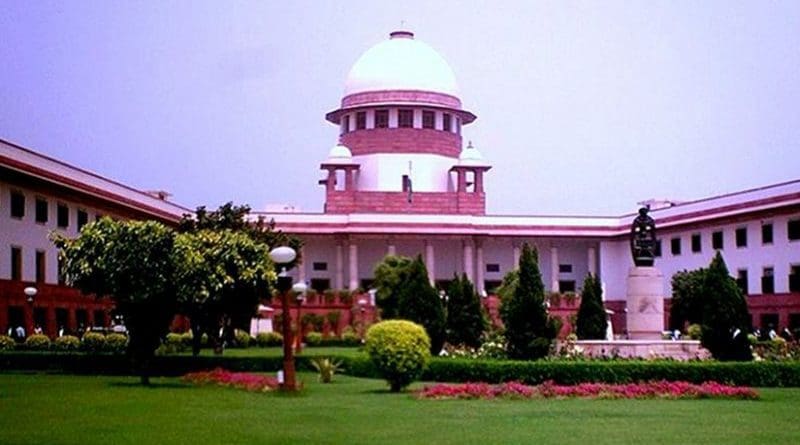India: Dealing With The ‘Business Of Insurgency’ – OpEd
By Observer Research Foundation
By Deepak Sinha
The Armed Forces Special Powers Act (AFSPA) is once again in the eye of the storm following the recent Supreme Court ruling by Justice Madan Lokur and Justice U. U. Lalit on alleged extra-judicial killings in Manipur. The ruling though may lead to an unintended situation the honourable justices may never have imagined.
In a recent paper, Makeover of Rainbow Country: Border Security and Connecting the Northeast, published by the Centre for Land Warfare Studies, New Delhi, my colleagues, Lt. General J. S. Bajwa (Retd), Major General N. G. George (Retd.) and I, have concluded that “the insurgencies we face in Manipur, Assam, Meghalaya and Tripura appear to be different; they are neither withering away nor gaining momentum to progress to the next stage of civil war. The only logical conclusion that can be drawn from this state of affairs is that what we face today is no longer an insurgency in the correct sense of the term, but the business of insurgency.”
We have further elaborated on the manner in which politicians, bureaucrats and members of the security establishment gain from the prevailing situation and are thus motivated participants, unwilling to change the status quo.
While the decision to lift AFSPA still continues to be very much in the hands of the Union and State Governments as that power rests with the executive branch, what, however, is a game-changer that will force the Government to act, is the court’s interpretation of relevant sections of the Criminal Penal Code and the Army Act that allows local courts to unilaterally commence proceedings against Army personnel, despite the immunity provided by AFSPA.
Regardless of what the political leadership does or expects from the military hierarchy, troops on the ground will be cautious to the extreme and probably avoid engaging militants, given the directions of the court to take away the AFSPA protection. The downside of these directions is the impact they may have on Army operations in Jammu and Kashmir, where the situation is different from that in the North East.
The court seems to have opened a Pandora’s Box in its interpretation of who should be termed a ‘militant’ or ‘terrorist’ and what it sees as excessive force. For example, if Justice Lokur’s reported statement that “A person carrying a weapon in a disturbed area in violation of a prohibition to that effect cannot be labeled a militant or terrorist or insurgent” is to be treated as gospel truth, then we are left wondering as to what action would lead to an individual being legally declared a terrorist or militant? Does it imply that a soldier can only open fire after he has been fired at? Isn’t that putting him at a great disadvantage? How will the court determine who fired first?
This problem is further compounded by the judges elaboration on the quantum of firepower that can be brought to bear on militants during an operation by stating that, “there is a qualitative difference between use of force in an operation and use of such deadly force that is akin to using a sledgehammer to kill a fly; one is an act of self defence while the other is an act of retaliation.” In this context, my earlier criticism of the military leadership for not using helicopter gunships to destroy a building in Pampore where militants were holed up that resulted in the death of three Special Forces soldiers, would be deemed heretical. Tell that to the next of kin.
The judiciary may like to believe that by the single stroke of a pen we no longer face militancy in this country. But that is far from the truth. With all due respect to the judiciary, it is hardly feasible for those who live behind high walls and are protected round the clock in Lutyens Delhi, to comprehend or visualise the realities of an insurgency-hit area. The judges appear to be unaware of the extraneous factors at play in such areas, and the lengths that insurgent groups go to, and the brutal tactics they employ to cow down their opponents, subvert the administration and reduce the effectiveness of security forces.
It is an open secret that in the North East, politicians, members of the administrative Services, including members of the lower judiciary, and the local population pay regular taxes to insurgent groups in their areas. Does the court believe that soldiers will receive fair treatment at the hands of local officials including members of the judiciary in such a hostile environment?
This ruling has only added to the uncertainties that already surround a soldier operating in a counterinsurgency environment. Its impact will be felt in the coming years as the Army disengages from counterinsurgency operations, and insurgents enjoy a free run.
Finally, this begs the answer to the question: When will the elaborate security establishment set up at exorbitant cost to tax-payers for protecting the elite, from attacks by militants or terrorists be dismantled? There can be no greater hypocrisy than for the elite to enjoy the fruits of a secure environment while those responsible for keeping it that way must fend for themselves.
This article originally appeared in The Pioneer.

